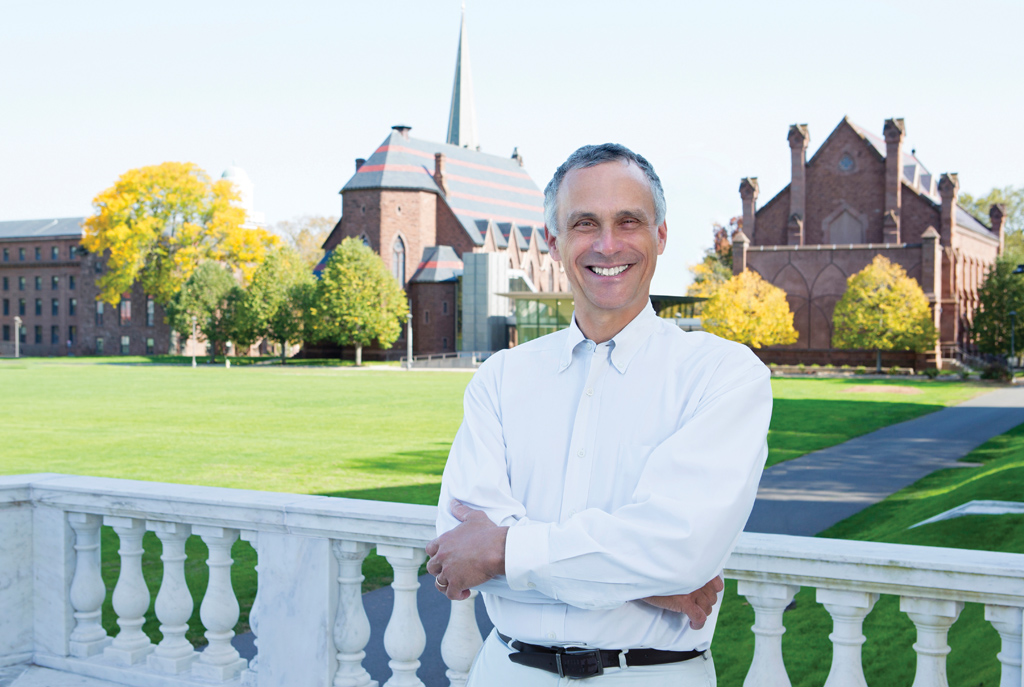PRESIDENT’S LETTER
Education depends fundamentally on our ability to generate optimism and find reasonable (defensible) ways to sustain it. When our faith in the future is shaken, whether it be by technologies we don’t understand, economic competition that undermines job security, or by cultural forms that challenge our sense of identity, when our faith in the future is shaken, we often criticize education as having failed to prepare us for our current predicaments. When our faith in the future is shaken, we often turn to the past, to tradition. This is one of the reasons why “the anti-traditional tradition” of liberal learning has once again come under such critical scrutiny. This was my topic at a recent exchange that Wesleyan and the Chinese Academy of Social Sciences organized in Beijing.
The critique of university education was already intense in the middle of the 19th century when Ralph Waldo Emerson wrote. He famously attacked the kinds of scholarship that merely taught obedience to authority, that merely developed subservience to the past under the guise of sophistication. One can indeed learn from the past, the Sage of Concord emphasizes, as long as one keeps looking towards the future. One must, Emerson insists, be an inventor to read well. He readily admits that guidance of the best books is a great service, but this service can turn into corruption if they teach subservience to the material—if they teach dependence.
“Colleges, in like manner, have their indispensable office—to teach elements. But they can only highly serve us, when they aim not to drill, but to create; when they gather from far every ray of various genius to their hospitable halls, and, by the concentrated fires, set the hearts of their youth on flame.”
Emerson here is radicalizing the notions of education that Thomas Jefferson developed when founding the University of Virginia. The enemy for the founding father was rote learning; the plague was to be trained for a destiny that had already been chosen for you. Emerson builds on Jefferson in looking to institutions of advanced learning for inspiration, for transformation through creativity. He does so because without transformation America would likely suffer from entrenched economic elites who would promote social conformity as a way of shoring up their own privileges. University campuses deserving of our support should be places of equality that also challenge social convention.
The campus as a place of equality and freedom has deep roots in America, at least as far back as Jefferson. Even with all his prejudices, he favored education at the public expense to prevent the creation of permanent elites based on wealth who would try to turn the government’s powers to their own private advantage. Jefferson believed strongly that given the variability in human capacities and energy there would always be elites—his notion of equality was an equality of access or opportunity, not an equality in which everybody wins. But he also believed strongly that without a serious effort to find and cultivate new talent, the nation’s elites would harden into an “unnatural aristocracy,” increasingly privileged, corrupt, and inept.
From Jefferson through Emerson and on to our own day, we have preserved the belief that education allows for the experience of freedom as one’s capacities are enhanced and brought into use. The author of the Declaration of Independence wanted university students to make these discoveries for themselves, not to be told to study certain fields because their futures had already been decided for them by their families, teachers, churches, or government. The author of “The American Scholar” writes of students who can “resist the vulgar prosperity that retrogrades ever to barbarism” and shape the culture with independence and vitality. To my great surprise, one of our hosts in China quoted Emerson back to me to emphasize his own worries that the pursuit of prosperity in his country was undermining a culture educators were committed to preserve.
Can we in America find a way to take the experiences of freedom and equality we find in education at its best and translate them to the sphere of politics and society more broadly without at the same time increasing governmental tendencies toward tyranny? Of course, higher education has its own dilemmas of fairness and of elitism, but that does not absolve us of the responsibility to connect in positive ways what we value in research and learning to our contemporary situation. To make these connections productive, universities must at the very least strive to be places where young people discover and cultivate their independence while resisting the trends of economic inequality and social conformity. Emerson thought we might educate scholars to become “the world’s eye” and “the world’s heart.” We should aspire to do nothing less. UPFRONT

